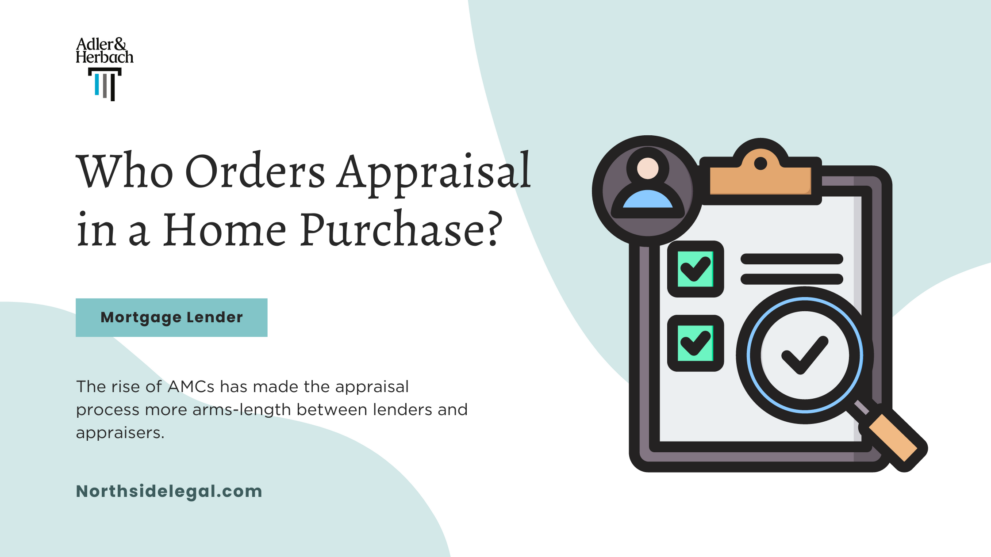When buying a home, an appraisal is a critical part of the process. But who is responsible for ordering the professional valuation of the property – the buyer or seller? Or is it the mortgage lender who requests the appraisal report?
Understanding appraisal ordering ins and outs helps buyers avoid delays and ensures the transaction stays on track. Let’s examine the details of who gets the ball rolling on the property appraisal.
Who Orders the Appraisal when buying a house?
The mortgage lender typically orders the home appraisal to verify the property’s value and protect their investment. This happens after a purchase agreement is signed, the loan application is submitted and a few days into the underwriting process. Although lenders manage this process, buyers can order an independent appraisal in certain situations.

1. The Mortgage Lender Orders the Appraisal
In the vast majority of cases, it is the mortgage lender that orders the home appraisal. This holds true for nearly all conventional, FHA, and VA loans.
Lenders require the appraisal because it protects their investment by confirming the property is worth at least the amount of the loan. The appraisal prevents buyers from borrowing more than what the home is truly worth.
So once you are under contract, the lender takes responsibility for ordering a professional appraisal from a state-licensed or certified appraiser. Typical lenders use an approved list of third-party, independent appraisers to handle valuations.
Timing of the Appraisal Order
Lenders order the appraisal soon after the purchase agreement is signed and the loan application is submitted. They want to get the valuation process moving so there are no delays in closing the loan.
It is also important to order the appraisal early, since the buyer normally has limited time until the financing contingency period expires. This contingency is designed to give the buyer time to apply and get approval for a home loan, without risking loss of their earnest money. Since the appraisal will be necessary to the loan approval, it should be ordered early, so as not to delay the approval.
Expedited Appraisal Options
While the lender handles the standard appraisal process, buyers do have options to speed things up. Lenders may offer an expedited “rush” appraisal for an extra fee, often around $250.
Learn more about
- How long an appraiser stays at your house?
- What happens after appraisal and underwriting?
- What does a home appraisal cost?
Buyers can also obtain a preliminary valuation report upfront, before having a purchase contract. This can give the parties some peace of mind regarding the property value before making an offer.
When purchasing a home in cash, buyers sometimes choose to order an appraisal themselves, since there will not be a lender involved.

Appraisal Management Companies
Although lenders order the appraisal, they rarely send their own in-house appraiser. Most use an Appraisal Management Company (AMC) that maintains a network of appraisers and schedules the property visit.
The rise of AMCs has made the appraisal process more arms-length between lenders and appraisers. Lenders provide the AMC information about the property, loan amount and other details to coordinate the appraisal.
2. When the Buyer Orders an Appraisal
In some less common scenarios, the buyer needs to take the lead on ordering the appraisal:
- When making an all-cash offer, there is no bank requiring an appraisal. The buyer can choose to get one for their knowledge and records.
- If the buyer plans major renovations after purchase, they may want to get a “before” appraisal done independently to understand the home’s as-is value.
- A buyer may also commission their own appraisal before making an offer to help determine a fair price and counteroffer amount.
- When buying a home “subject-to” the existing mortgage, an independent appraisal helps the buyer decide if the deal makes sense.
A buyer-ordered appraisal is uncommon but can be useful in certain situations. Consult your real estate agent or lender to understand when paying for your own separate appraisal is beneficial.
Do you wonder how long appraiser takes to get back and when buyer get the appraisal report?

In Most Cases,
Coordinating with the mortgage lender is the easiest way to get a timely, trusted appraisal when buying and financing real estate.
Lender-ordered appraisals also avoid any conflicts of interest in the valuation process.
Now you know who handles ordering the essential property appraisal!


